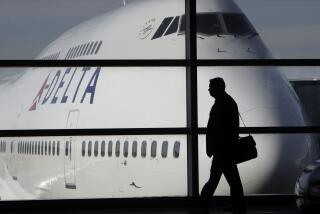Source of American Airlines computer glitch yet to be disclosed
Nearly a week after a computer glitch grounded hundreds of its planes, American Airlines has yet to disclose the exact cause of the problem that frustrated passengers stuck in crowded terminals across the country.
American’s chief executive, Tom Horton, would say in a video apology only that “we had a software issue that impacted both our primary and backup systems.”
But as airline computer systems become more interactive and complicated, computer experts warn that outages may become more common if airlines do not regularly test and maintain their systems.
“We are pushing the limits of human capabilities with these things,” said Bill Curtis, senior vice president and chief scientist at Cast, a software analysis and measurement company in New York. “What’s happening is these systems have gotten larger than any single person or single team can handle.”
American’s computer outage, which lasted two to three hours Tuesday, will probably force the airline to move with caution when it begins its merger with US Airways, said Farokh Bastani, a computer science professor at the University of Texas at Dallas.
Once the merger is approved, US Airways plans to transfer its reservations data to American’s computer system, officials from both airlines said.
“If some problems happen before any merger is taking place, it raises the possibility of problems when they integrate the systems,” Bastani said.
By the end of the week, American’s system seemed to be operating normally. Still, the airline and its regional carrier, American Eagle, canceled several hundred flights because of a non-technical problem: foul weather around Dallas and Chicago.
•Fliers blast TSA, full-body scanners
Airline passengers have been walking through full-body scanners for nearly five years, but only now are fliers getting a chance to officially tell the federal government what they think about the screening machines.
In response to a lawsuit, the U.S. Court of Appeals for the District of Columbia Circuit ruled that the Transportation Security Administration could continue to use the scanners as a primary method of screening passengers. But the court ordered the TSA to give the public a 90-day comment period, which the agency failed to do when it launched the scanning program.
The comment period began online in March, and so far the TSA has been getting an average of 26 comments a day — nearly all of which blast the TSA and the scanners for a variety of reasons.
The most common objection is that the scanners violate the 4th Amendment to the Constitution, which guards against unreasonable search and seizure.
“Screening without probable cause is a violation of the 4th Amendment to the U.S. Constitution,” wrote Russell Yates of Los Angeles.
But in the 2011 ruling, the U.S. Court of Appeals rejected that argument, saying “screening passengers at an airport is an ‘administrative search’ because the primary goal is not to determine whether any passenger has committed a crime but rather to protect the public from a terrorist attack.”
Another common objection to the scanners is that they expose passengers to unsafe levels of radiation and are not effective at stopping terrorists.
“It is scientifically indefensible to irradiate the vast majority of passengers,” wrote Richard Layton of Terre Haute, Ind.
The TSA says several studies show the scans pose no significant hazard to passengers.
Finally, several dozen critics said the government doesn’t have the right to take “naked” or “nude” pictures of them to look for hidden weapons.
That may be a moot point. In response to a new federal law, the TSA is expected to pull out of airports by this summer all scanners that generate what look like naked images of passengers.
Most of those scanners will be replaced by a second type of scanner that shows hidden objects projected onto a generic avatar image on a screen — not on a nude-like image of a passenger.
To add your comments, go to the website https://www.regulations.gov and type in the case, TSA-2013-0004.
More to Read
Inside the business of entertainment
The Wide Shot brings you news, analysis and insights on everything from streaming wars to production — and what it all means for the future.
You may occasionally receive promotional content from the Los Angeles Times.










